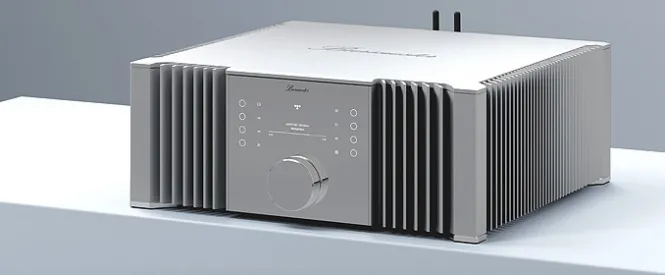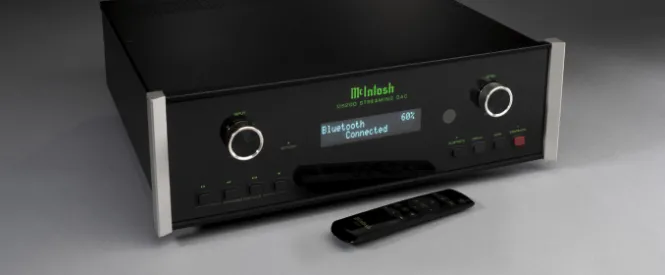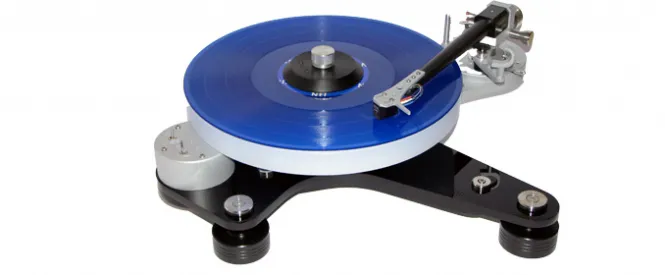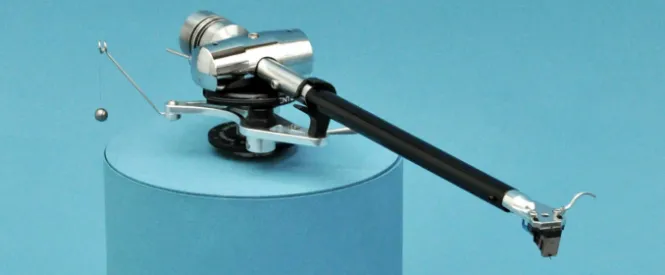dCS Rossini APEX CD Player & Streamer Review
Rafael Todes samples this newly enhanced, disc-spinning high-end digital delight…
dCS
Rossini APEX Player
£28,000 RRP
Does dCS need any introduction? Anyone seriously interested in hi-fi will already know the key role that Data Conversion Systems (dCS) played in the genesis of high-end digital audio. The company has a string of firsts to its name, from the first commercially available 24-bit, 96kHz-capable DAC, the first upsampler and the first product with a USB digital input. It’s fair to say that this relatively small Huntingdon-based company has punched far above its weight and at times almost single-handedly driven the development of digital.
Perhaps this should come as no surprise, given that it was originally set up in Cambridge, UK, in the late eighties as a high-tech aerospace defence contractor. After designing and manufacturing radar systems for British jet fighters flying at that time, the company’s founder transferred his number-crunching know-how to something a little closer to his heart – high-fidelity music reproduction. Since then, dCS hasn’t looked back and now makes some very fine-sounding digital converters, one of which is the Rossini APEX Player that you see before you…
As its name suggests, this variant is more than just a DAC, as it also comes with an optical disc transport – what we used to call a CD player – along with a standard-fit streaming board shared by dCS’s top source products. The original Rossini was launched a few years back and sits in the company’s range below the flagship Vivaldi and above the ‘entry level’ Bartok. This latest version adds the new APEX system, more of which soon…
UP CLOSE
To readers who aren’t too familiar with dCS, one thing needs to be spelled out from the beginning. Whereas almost all hi-fi DAC separate manufacturers use one of a small number of commercially available, off-the-shelf chipsets to do the digital-to-analogue conversion, dCS uses its own so-called Ring DAC. This is, in effect, a hardware platform using an FPGA (Field Programmable Gate Array), which runs custom dCS-written software code. It’s a very laborious, time-consuming and expensive way of doing things, but means that the company has complete control of what’s going on as far as the digital processing is concerned.
It also means that dCS DACs can be periodically updated, flashed with new firmware to give better sound or added features. We saw this happen with the entry-level Bartók DAC last year, which got new ‘Mapper’ software via a free download, and this brought about quite a dramatic performance hike at no cost to existing users.
That’s not the case with APEX, however, which requires both new software and new hardware. People with current-spec Rossinis and Vivaldis can return their DACs to dCS for an upgrade, while all new examples now come with it as standard. At the time of writing, there are no plans for the ‘entry level’ Bartók DAC to receive the APEX upgrade.
The new Ring DAC APEX hardware features several changes, brought about by a total rethink after some ‘blue sky thinking’ during the Covid lockdowns a couple of years ago. According to dCS, the reference supply that feeds the Ring DAC circuit board was re-examined and improved. The engineers also thoroughly modified all subsequent stages of the Ring DAC, including the summing and filter stages. The output stage responsible for buffering the analogue signals generated by the Ring DAC was redesigned. Individual transistors on the Ring DAC circuit board were replaced with a compound pair, thereby improving symmetry and linearity, and adjusting the layout of components on the Ring DAC circuit board. These various adaptations yield a new, improved analogue board that is said to be quieter than previous iterations and over 12dB more linear.
As you would expect, this DAC is bristling with features and connectivity. It can stream Tidal, Qobuz, Deezer and Internet radio natively via the app, and is also Roon-ready and UPnP compatible. It has USB (both types), S/PDIF, RCA and TOSLINK, AES and Dual AES inputs, as well as being fully MQA compatible – the latter with dCS’s unique, custom-coded implementation. This Rossini Player variant sports a silver disc spinner, although those looking to play SACDs should look to the Rossini CD/SACD Transport coupled with the Rossini APEX DAC. Or, indeed, the Vivaldi One APEX – one of the world’s most expensive SACD machines. It has both balanced XLR and unbalanced RCA analogue outputs, naturally.
dCS machines were one of the first to be app-controlled, and it shows as the latest version of the company’s bespoke Mosaic app is very good indeed. It generally works well and efficiently, although I sometimes couldn’t see the information on the track as only a limited amount was viewable on my particular iPhone. Still, this is a minor grumble in what is otherwise a stable and intuitive app, and none of the afflictions of some rival manufacturers’ apps were seen here. A superb quality remote control is also supplied, which gives a whole range of options for input, filter and phase, which you’d otherwise have to access through this machine’s complex menu system.
For this review, I used my pair of VAC Phi 200 valve monobloc power amplifiers driving a pair of B&W 802D4 loudspeakers. This was fed by a Townshend Allegri Reference Preamplifier, with a PS Audio PS10 power re-generator delivering the juice. A Chord DAVE DAC and M-Scaler DAC combination was used as my benchmark of a top-quality digital front end.
THE LISTENING
The new Rossini APEX Player produces a really powerful, impressive and taut sound, with more low-frequency impact than I am used to via my reference Chord combo. It leaves the listener in no doubt that they’re hearing one of the finest digital front ends that money can buy – but you soon forget how it ranks in the great scheme of things and find yourself getting lost in the music being played.
For example, with Simon Rattle’s recent recording of Haydn’s 88th Symphony with the Berlin Philharmonic Orchestra, I could really feel the bass line harmonies in a way that the Chord kit didn’t quite reveal. Bass was articulate and forceful but, at the same time, extremely well-controlled. The orchestra sounded full and extended way back beyond the speakers. I was aware of the absence of distortion, as the sound was clean and sparkling with a crystalline clarity to it. I loved hearing the clean tails to the resonance of strong chords; it was possible to make out the decay organically phrase-off, a trick that few digital front ends can perform.
I was struck by the overall vibrance and tangibility of the sound. A decade or two ago, I used to find dCS gear lacking in the richness of instrumental timbre, but that’s simply not the case anymore. Rather, you get a kind of ‘photo-real’ sound, with – for example – orchestral strings coming over as wonderfully lifelike; this is something that I, as a professional violinist, feel qualified to say. I could pretty much ‘feel’ the texture of horse hair on gut, even if they do use synthetic strings on bows these days! The sound was so well resolved that it’s dramatically better than almost all other digital sources I’ve heard – with only products such as dCS’s own flagship Vivaldi DAC doing better.
The Rossini APEX has massive physical scale, which becomes very apparent when you listen to epic orchestral works like Turangalila by Messiaen, with the Royal Concertgebouw Orchestra conducted by Riccardo Chailley on Decca. The sheer size of this crazy piece causes many systems to turn to jelly, but not so the dCS which created an iron framework for the portrayal of the expanded orchestra. The soundstage was cathedral-like in size, and the music’s complex poly-rhythms were deftly portrayed. The overall effect was intoxicating.
Rhythmic dexterity is the other standout feature of the Rossini APEX. This device renders the leading edges of musical notes with immense speed – it has blistering transient attack, which makes for a gripping, enthralling and edge-of-the-seat listening experience. By contrast, I found the same recording on my reference Chord combo sounded less structured and with smoother leading edges. On the other hand, it was fractionally tonally sweeter and more lush sounding, with a subtly more romantic feel. The music seemed more realistic on the dCS, largely on account of its sharper leading edges and greater weight in the bass, which in turn created the dance rhythms more effectively.
This difference in presentational style is more apparent on beat-driven programme material like rock music. Bruce Springsteen’s Born in the USA showed a greater difference between these two great digital warlords, with the dCS sounding more lively due to its sharper bass control – something that made the track come to life. Percussion was positively sizzling, and the soundstage appeared more open and generous via the dCS, with the Chord combo sounding a little more constrained by comparison.
As an aside, I can see how those who listen predominantly to rock music would prefer the Rossini APEX, which amuses me because the music of Rossini is as far from Bruce Springsteen as you’re going to get. Indeed, the Bel Canto nature of his tune writing would probably suit the Chord better! Perhaps this product should be renamed the dCS Van Halen?
The built-in disc transport is excellent. As it isn’t possible to switch from streaming to CD on the handset, one has to physically get up and click the small button on the fascia of the unit. This required me to actually move from my sofa to make comparisons, which isn’t a regular occurrence for those like yours truly who stream everything nowadays!
Listening to the Solti recording of Brahms’ 4th Symphony on Compact Disc as against streaming from Tidal on a non-MQA recording and to my ears, the silver disc proved superior. My position on the great debate as to whether CD is better than 16/44 digital streams is that it’s getting ever closer from a start point where streaming was very much the poor relation. Indeed, I find that the better of the two is now often down to the precise version being played. With the Rossini APEX Player and a true like-for-like comparison, the CD had greater openness and depth to the sound – making the streamed version seem just a tiny bit squashed. I must add, however, that in my experience, the streaming boards used in dCS products are superb and second to none. I myself use a dCS Network Bridge, which pretty much shares the same circuitry – in another one of my reference systems.
Overall then, I found the Rossini to be a superb performer. It is extremely expensive by normal hi-fi standards, yet is still good (or should I say, ‘great’) enough to make people spend the money. I love the way it plays a wide variety of formats and codecs without fuss to exceptionally high standards. Listening to the beautifully recorded Beaux Arts Piano Trio CD playing Haydn’s 40th Piano Trio, for example, and the sheer quality of sound reproduction blew me away via this unit. Here was an entirely believable three-dimensional space, inside which the piano trio was perfectly placed spatially. The piano sounded exactly as I would expect a Steinway to sound close up, and the two strings were sweet and coherent. Above all, there was a sense of being privy to some extraordinary music-making, with the Rossini letting you into this special event!
That’s the great thing about this player. Unless you’re a film star, business tycoon or lottery winner, the Rossini APEX is about as expensive as digital sources get. And all that money buys you super easy and effortless access to a wide range of music formats, all of which are instantly unlocked to give their best possible sound. Importantly, this includes CDs, which are virtually ubiquitous now and still an extremely meaningful thing for many music lovers.
THE VERDICT
 The new dCS Rossini APEX Player is at the bleeding edge of digital reproduction and represents amongst the very best available sources. The unit is extremely well-engineered and handsome, has vast digital format compatibility, and is highly future-proofed thanks to its user-friendly firmware upgrade system. Better still, you can further improve the sound with the simple expedient of adding the Rossini Clock. This machine is expensive, but it cannot be anything else considering its performance level. A great, state-of-the-art product then, now better than ever.
The new dCS Rossini APEX Player is at the bleeding edge of digital reproduction and represents amongst the very best available sources. The unit is extremely well-engineered and handsome, has vast digital format compatibility, and is highly future-proofed thanks to its user-friendly firmware upgrade system. Better still, you can further improve the sound with the simple expedient of adding the Rossini Clock. This machine is expensive, but it cannot be anything else considering its performance level. A great, state-of-the-art product then, now better than ever.
For more information visit dCS
Rafael Todes
Gifted violinist Rafael is one quarter of the Allegri String Quartet, playing second fiddle. Once a member of the CBSO under Sir Simon Rattle, he now teaches at London’s Junior Royal Academy. A long-time audiophile, he’s still on a quest for the perfect sound.
Posted in: Applause Awards | 2023 | DACs | Sources | Streamers | CD / SACD Players | Hi-Fi | StereoLUX!
JOIN IN THE DISCUSSION
Want to share your opinion or get advice from other enthusiasts? Then head into the Message
Forums where thousands of other enthusiasts are communicating on a daily basis.
CLICK HERE FOR FREE MEMBERSHIP
Trending
applause awards
Each time StereoNET reviews a product, it is considered for an Applause Award. Winning one marks it out as a design of great quality and distinction – a special product in its class, on the grounds of either performance, value for money, or usually both.
Applause Awards are personally issued by StereoNET’s global Editor-in-Chief, David Price – who has over three decades of experience reviewing hi-fi products at the highest level – after consulting with our senior editorial team. They are not automatically given with all reviews, nor can manufacturers purchase them.
The StereoNET editorial team includes some of the world’s most experienced and respected hi-fi journalists with a vast wealth of knowledge. Some have edited popular English language hi-fi magazines, and others have been senior contributors to famous audio journals stretching back to the late 1970s. And we also employ professional IT and home theatre specialists who work at the cutting edge of today’s technology.
We believe that no other online hi-fi and home cinema resource offers such expert knowledge, so when StereoNET gives an Applause Award, it is a trustworthy hallmark of quality. Receiving such an award is the prerequisite to becoming eligible for our annual Product of the Year awards, awarded only to the finest designs in their respective categories. Buyers of hi-fi, home cinema, and headphones can be sure that a StereoNET Applause Award winner is worthy of your most serious attention.





